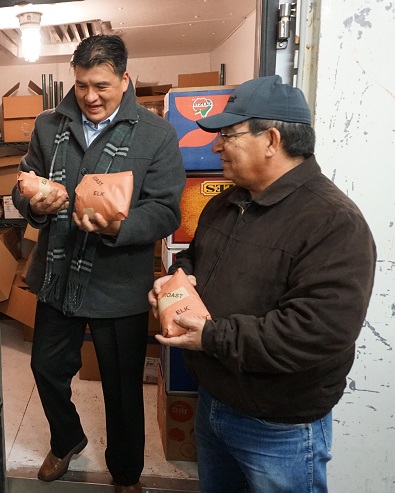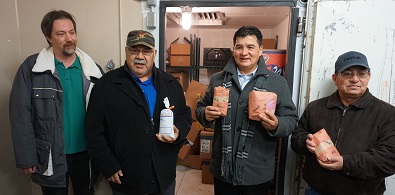FSIN Chief Bobby Cameron and PBCN Chief Peter Beatty with some of the meat donations. Photo by Chelsea Laskowski.
Food bank and shelter clients all over Saskatchewan will have access to traditional meats this winter due to the efforts of well over 100 First Nations hunters who have gathered and donated meat to a Federation of Sovereign Indigenous Nations initiative.
This week, FSIN Chief Bobby Cameron is making the rounds all over the province to drop off around 2,000 pounds of boar, elk and moose meat that have been hunted in the traditional way.
The packaged meat is headed to the Prince Albert Food Bank, to shelters in North Battleford and Yorkton, and to a soup kitchen in Regina.
On Monday, the first delivery made its way to Prince Albert with Chief Cameron and two other chiefs carrying hundreds of pounds of meat to the food bank’s freezer.
This is part of an FSIN initiative that started in 2014 as a way to share wild meat with First Nation members that live in urban centres.
Cameron said he can sympathize with the struggles faced by those who access food banks and shelters, because he grew up “pretty rough, pretty poor” in North Battleford.
“Meals weren’t abundant at the time, clothing wasn’t abundant at the time. So the reality is, a lot of our urban folks do have a hard time,” he said.
Cameron said his father instilled the skills he needed in order to practice the inherent and treaty right to hunt.
“When dad was sober, we hunted lots. So we ate quite a bit of traditional meat and fish because that was part of our diet, as it is for people in the north. That’s their way of life,” he said.
The food bank’s Wes Clark, PAGC Chief Ron Michel, FSIN Chief Bobby Cameron, and PBCN Chief Peter Beatty with the meat donations. Photo by Chelsea Laskowski.
Most of the meat comes from northern and central Saskatchewan, with the boar meat coming from the south.
Chief Peter Beatty of Peter Ballantyne Cree Nation is thankful for the donation, which he says is in keeping with his people’s cultural values.
“Generally when they do get a moose, or fish or whatever, they share it. They give to the elders, they give to the community members,” he said.
“When they get a moose it doesn’t last very long.”
Beatty said his band members often move to urban settings because of a lack of housing on reserve, but the lack of natural resources in a city lead to social issues that keep people impoverished.
The struggles of living in a different setting are evident in Prince Albert Food Bank’s statistics that say 90 per cent of their clients are Indigenous. The vast majority include children and families.
It’s been a tough year for food bank usage going up across Saskatchewan and the country, but Prince Albert Food Bank’s management says it’s been a great year for meat donations.
Earlier this fall, thousands of pounds of bison meat was repurposed and donated after five illegally hunted bison were discovered outside Prince Albert National Park. Executive director Wes Clark also said Walmart has also stepped up on donating red meat.
Clark said with how busy they are, the meat will likely last a week or so. Cameron said they’d like to donate more hunted meats in the future.

